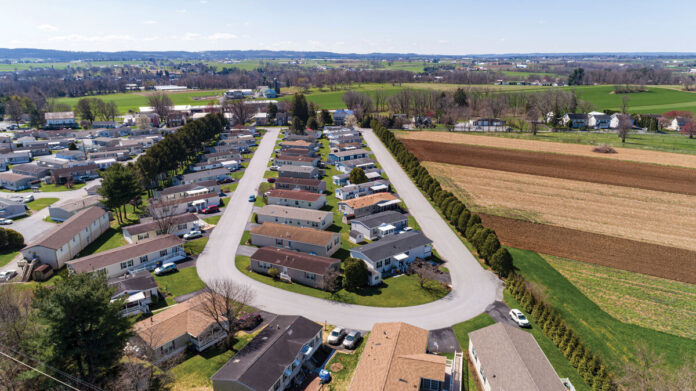Leverage InsurTech Breakthroughs to Enhance Community Protection
By Dallas Wong

In the dynamic landscape of manufactured home communities, mitigating risk isn’t just about safeguarding profits; it’s about ensuring the integrity and longevity of the entire community. However, traditional insurance solutions often fall short in meeting the complex needs of communities, leaving property owners vulnerable to unforeseen liabilities.
The Importance of Tenant Legal Liability Coverage
At the core of effective community management is the ability to safeguard a property against liability risks — particularly those arising from resident actions. Incidents such as fires, water damage, and more can result in substantial repair costs and potential lawsuits. In many cases, residents may not possess adequate personal insurance to cover these liabilities, thereby shifting the financial burden onto the owners or operators of the community. A Tenant Legal Liability (TLL) policy is designed to safeguard the interests of community owners/operators. It provides insurance coverage for the property where a resident lives, protecting the community’s investment. However, it’s essential to note that TLL insurance does not extend coverage to residents themselves.
CoverTree’s Maple Program is a new, proprietary offering tailored to ensure that manufactured home community operators are not left vulnerable to these risks. The program protects against certain types of property damages to homes and community property caused by residents, providing a crucial safety net that helps maintain financial stability, operational continuity, and maintenance.
The Maple Program includes an innovative Tenant Legal Liability policy for communities combined with their proprietary risk management platform to automate the monitoring of resident insurance statuses across your portfolio. The Maple Program is tailored to bridge the gaps in insurance coverage and protect against the financial and legal ramifications of resident negligence. It offers a proactive approach to risk management that every property owner should consider.
Key Benefits of TLL Coverage
1. Comprehensive Risk Management: TLL insurance policies have become a critical tool in the risk management strategy for many manufactured home community operators. The Maple Program specifically targets the risks posed by the negligence of residents, offering coverage that fills in where typical renters’ insurance might fall short, thus protecting investments and ensuring smoother operational management.
2. Cost-Effectiveness: The cost associated with recovering from tenant-caused damages can quickly escalate, particularly in densely populated communities. The program provides an economical solution by covering these potential expenses, reducing the need for extensive capital reserves to handle unexpected damages.
3. Enhanced Community Standards and Appeal: A community that is well protected and well managed attracts higher-quality residents, and retains them longer. By implementing a solution like CoverTree’s Maple Program, community operators can promote a safer, more responsible living environment. This not only enhances the reputation of the community but also contributes to long-term resident satisfaction and retention.
4. Legal and Financial Security: TLL coverage shields operators from potential legal action that could result from tenant negligence, thereby safeguarding your financial and legal standing. A TLL policy will pay a claim before a commercial general liability insurance plan and will reduce the overall commercial risk, likely resulting in a discount on CGL.
Implementing Tenant Legal Liability Insurance in a Community
Integrating a TLL program into a community’s risk management plan requires a proactive approach. CoverTree specializes in collaborating with community operators to tailor the coverage options to fit specific needs. Here are a few steps to effectively implement and maximize the benefits of the Maple Program:
Partnership: We formalize how we’ll work together. We determine needs and goals and create a custom program that works for the portfolio. Lease Integration: Incorporate TLL coverage requirements into the leasing agreements. Create and distribute a privacy policy and notice to residents. Clearly communicate these requirements during the onboarding process to ensure understanding and compliance.
Data Collaboration: Share applicable resident data with CoverTree to initiate the TLL program. Residents and their insurance statuses will be available on an exclusive platform. And community operators get access to proprietary data dashboards to view a variety of metrics about residents and the associated insurance.
Education: Educate employees about the importance of resident insurance and how it protects the community and an employees role in running the community. Encourage team members to maintain personal homeowners or renters insurance so that they have coverage that protects their home and belongings.
For owners and operators of manufactured home communities, the introduction of Tenant Legal Liability insurance represents a strategic enhancement to risk management practices. By adopting the program, operators not only protect assets from unforeseen resident-caused damages but also improves the overall management and appeal of a community to investors. In an industry where reducing risk contributes directly to operational success and expansion capabilities, a robust approach to liability insurance is not just beneficial — it’s essential.
Dallas Wong serves as the implementation manager at CoverTree Manufactured Home Insurance where her dedication and expertise make an impact on the lives of more than 70,000 residents in 500-plus manufactured home communities across the nation. Through her work at CoverTree, Wong is securing futures and fostering peace of mind for community operators, individuals, and families.










